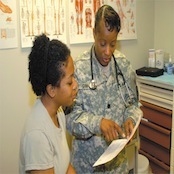Alvin H. prefers to remain anonymous, but otherwise, he is happy to share his story as an RN. Job security, excellent pay and benefits, worldwide travel, career training and advancement and service to others and his country are what he enjoys most about being a military nurse.
"I became an EMT after a four year stint in the Coast Guard, and loved the fast pace and being able to save lives right there on the scene," he said. Alvin noted that the pay didn't equal the work, though. "I still wanted to help people at a professional level, and nursing seemed the best way to do that." Starting out with an LPN degree from Cape Fear Community College, he worked for some time on a general medicine unit at a small hospital.
Alvin says that after searching for his best career path, he decided military nursing was the best way to go. "I enjoyed the service, so I enlisted in the U.S. Army Nurse Corps," he said. At that time, the nation was at war, and military nursing jobs urgently needed to be filled, so the Army sent Alvin to a hospital in Germany. Working in a surgical step-down unit during the Desert Storm campaign, he monitored and helped treat wounded soldiers. While wound care was his most important task, he also "helped patients deal with the physical and emotional pain of losing limbs, becoming blind and suffering from all sorts of other life-changing injuries."
Honorably discharged after four years of service, he decided to advance to an RN, and while working at a local hospital emergency department, he graduated from North Georgia State University with a BSN. "The courage and fortitude demonstrated by those young soldiers was a huge inspiration to me, and the Army promised plenty of security for a military nurse," said Alvin. Commissioned as a captain in the Army Reserve, Alvin's nursing career consists of a full-time job at a VA medical center and part-time service in the Reserves.
"At the VA, I work in the staffing pool and float among a variety of clinics. One day I work with orthopedic patients, while on another day, I might work on the general medicine floor, preparing patients for surgery or helping troubled veterans on the psychiatric unit," said Alvin. When on Reserve duty, he maintains his skills working with traumatic war injuries. Since they are officers, the Army also requires its military nurses to train as infantry leaders, a role Alvin feels honored to perform, if ever needed.
He toys with someday getting a master's degree in some advanced nursing field, but he is content with his current work. "I'm getting everything I want from life," he said. "I help people who pay the highest sacrifices for their country, I work in a field I absolutely love, and I can look forward to incredible security as a retired Army officer."
Photo Source: Flickr
[cf]skyword_tracking_tag[/cf]


